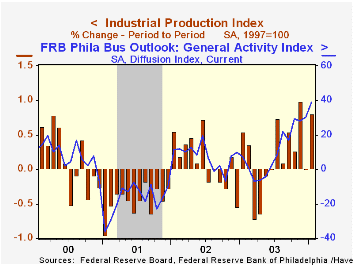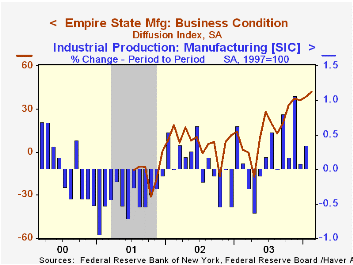 Global| Feb 17 2004
Global| Feb 17 2004U.S. Industrial Production Jumped
by:Tom Moeller
|in:Economy in Brief
Summary
Industrial production jumped 0.8% in January and about matched Consensus expectations for a 0.7% rise. December's slight gain in output was revised to no change. Cold winter weather boosted the production gain by raising utility [...]

Industrial production jumped 0.8% in January and about matched Consensus expectations for a 0.7% rise. December's slight gain in output was revised to no change.
Cold winter weather boosted the production gain by raising utility output 5.2% (4.3% y/y).
Production in the factory sector increased a moderate 0.4% and the December output gain was revised to 0.1% from 0.3% (2.3% y/y).
Output in selected high-technology industries continued to pace the figures in January and jumped 2.6% (24.6% y/y). Prior months' gains were revised lower. Output of computers and peripheral equipment rose 1.9% (14.2% y/y). Output of semiconductors & related equipment surged 3.2% (42.7% y/y) and output of communications equipment rose for the first month in three, up 2.0% (+4.2% y/y).
Excluding high-tech, factory output rose by 0.1% for the second month (0.8% y/y). Electrical equipment & appliance outputrose 0.4% for the second month (3.1% y/y). Furniture output also rose 0.4% for the third consecutive monthly gain (-2.4% y/y). Machinery output rose 0.7% but metals production fell. Output of nondurables was unchanged (-0.2% y/y).
Total capacity utilization moved up to 76.2%, the highest level since June '02. Y/Y growth in capacity was a low 1.1%, the slowest since early 1989.
| Production & Capacity | Jan | Dec | Y/Y | 2003 | 2002 | 2001 |
|---|---|---|---|---|---|---|
| Industrial Production | 0.8% | 0.0% | 2.3% | 0.3% | -0.6% | -3.4% |
| Capacity Utilization | 76.2% | 75.6% | 75.2%(1/03) | 74.9% | 75.6% | 77.4% |
by Tom Moeller February 17, 2004

The Empire State Index of General Business Conditions for February rose three points to 42.05, another record high. A decline in the index to 37.5 had been the Consensus expectation. January's level was revised slightly lower.
The new orders index improved to 34.93 following a slight January decline (revised down). The shipments index slumped 15 points to 26.61 from the January record. The employment index also slid to 16.54, a five month low.
The index of prices strengthened further to 33.62, a series' record.
The February index of expectations for business conditions six months ahead fell for the second month to 53.93, the lowest level since July. Expectations for capital expenditures improved moderately following a sharp drop in January.
The Empire State Manufacturing Survey is a monthly survey of manufacturers in New York State conducted by the Federal Reserve Bank of New York. Participants from across the state in a variety of industries respond to a questionnaire and report the change in a variety of indicators from the previous month. Respondents also state the likely direction of these same indicators six months ahead. April 2002 is the first report, although survey data date back to July 2001.
Like the Philadelphia Fed Index of General Business Conditions, the Empire State Business Conditions Index reflects answers to an independent survey question, not the components.
For more on the Empire State Manufacturing Survey, including methodologies and the latest report, click here.
| Empire State Manufacturing Survey | Feb | Jan | Y/Y (2/03) | 2003 | 2002 | 2001 |
|---|---|---|---|---|---|---|
| General Business Conditions (diffusion index) | 42.05 | 38.85 | 1.71 | 16.30 | 7.02 | -13.57 |
Tom Moeller
AuthorMore in Author Profile »Prior to joining Haver Analytics in 2000, Mr. Moeller worked as the Economist at Chancellor Capital Management from 1985 to 1999. There, he developed comprehensive economic forecasts and interpreted economic data for equity and fixed income portfolio managers. Also at Chancellor, Mr. Moeller worked as an equity analyst and was responsible for researching and rating companies in the economically sensitive automobile and housing industries for investment in Chancellor’s equity portfolio. Prior to joining Chancellor, Mr. Moeller was an Economist at Citibank from 1979 to 1984. He also analyzed pricing behavior in the metals industry for the Council on Wage and Price Stability in Washington, D.C. In 1999, Mr. Moeller received the award for most accurate forecast from the Forecasters' Club of New York. From 1990 to 1992 he was President of the New York Association for Business Economists. Mr. Moeller earned an M.B.A. in Finance from Fordham University, where he graduated in 1987. He holds a Bachelor of Arts in Economics from George Washington University.
More Economy in Brief
 Global| Feb 05 2026
Global| Feb 05 2026Charts of the Week: Balanced Policy, Resilient Data and AI Narratives
by:Andrew Cates






